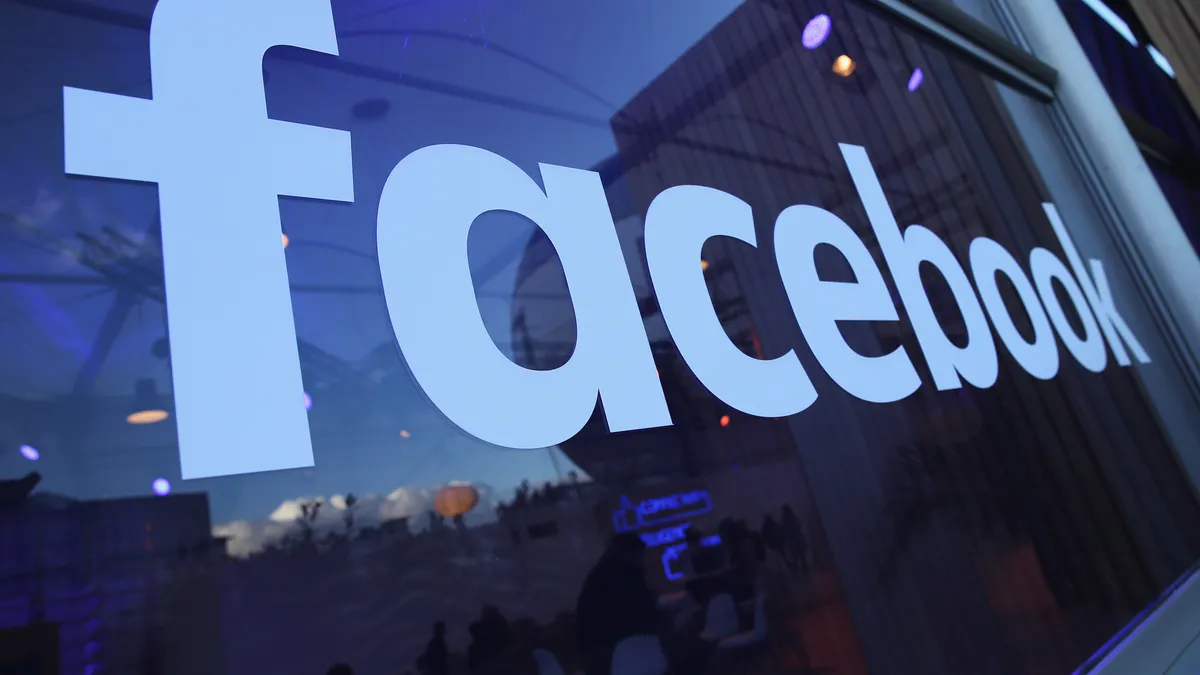Dive Brief:
- Facebook saw advertising revenue rise 56% year-on-year to $28.5 billion in the second quarter, according to an earnings statement released Wednesday. Total revenue was up 56% to $29.1 billion for the period.
- Gains were attributed to a 47% YoY jump in the average price per ad unit, as well as a 6% increase in the number of ads delivered. Looking to the rest of 2021, the company expects momentum to be carried by climbing advertising prices.
- However, Facebook also warned of ad-targeting headwinds — namely recent changes Apple has made to device tracking — that will have a clearer impact on revenue in the third quarter. Facebook is now enacting a number of initiatives around commerce, creators, audio, gaming and more to try and tap into fresh revenue streams and refashion itself as a "metaverse company."
Dive Insight:
Examined in a vacuum, Facebook delivered a strong Q2 as advertising demand rebounded following a patchy pandemic period. The recovery manifested in both higher ad prices and gains made in the total number of ads delivered. Other platforms, including Google and rival social media companies like Twitter and Snapchat, have felt newfound tailwinds as digital becomes a larger priority for marketers navigating the COVID-19 crisis.
But the year's first half also serves as the final stretch before Facebook will start to feel the effects of Apple's tracking changes, which are expected to deliver a blow to revenue. Facebook has sounded the alarm about Apple's policy tweaks since they were announced last year, and become embroiled in an increasingly public spat with the iPhone maker over privacy concerns.
Apple in the spring made its mobile Identifier for Advertisers — a key way for brands to keep tabs on iPhone users — an opt-in versus opt-out feature as part of the implementation of a new transparency framework. Reports indicate some Facebook advertisers are already panicking as opt-in rates remain low. It's a sign that consumers would prefer not to be tracked, even if enabling such features means receiving a more personalized advertising experience.
Facebook, which now has more than 3.5 billion monthly active users across its services, is pushing harder on a number of fronts to diversify revenue. Like a lot of digital players, commerce has become a bigger-ticket item as retailers make a radical shift online. On a call discussing the Q2 results with analysts, chief executive Mark Zuckerberg envisioned Facebook's properties as a full-stack experience, enabling everything from discovery and advertising to payments on apps like WhatsApp and Messenger. He described commerce as a "long-term" bet for the company.
At the same time, Facebook is directing greater resources to content creators who may be able to influence purchases more effectively than traditional advertising. The company will invest $1 billion in creators on its core big blue app and Instagram through 2022, Zuckerberg announced earlier in July. The creator fund looks to drive more activity to features like livestreaming and Reels, a TikTok copycat that Instagram introduced last August. Facebook increasingly sees TikTok as a significant competitive threat, and Instagram plans to redesign its service to center more on video-sharing to meet that challenge.
"Video, in particular, is becoming the primary way that people use our products and express themselves," Zuckerberg said on the call with analysts. "Video now accounts for almost half of all time spent on Facebook, and Reels is already the largest contributor to engagement growth on Instagram."
The executive later remarked that Facebook's myriad projects, including its work in areas like computing and virtual reality, all serve to help the company build a "metaverse." Metaverse is a buzzword traditionally associated with gaming that is meant to describe the growing intersection of digital and physical spaces, a bridge that has become more pronounced during the pandemic. Zuckerberg indicated the concept will serve as a sort of north star for Facebook as it tries to broaden its purview beyond the social media sphere in the years ahead.
"We believe that this is going to be the successor to the mobile internet," Zuckerberg said of the metaverse, adding that he thinks people will eventually view Facebook as a "metaverse company" versus a social media firm.
Amid that lofty transformation, Facebook is contending with growing regulatory scrutiny, a front where it's recently notched some wins. In June, a federal judge tossed out separate antitrust lawsuits filed by the Federal Trade Commission and more than 40 state attorneys general. In the ruling, U.S. District Judge James Boasberg wrote that the FTC failed to "plausibly establish" Facebook's monopoly power. Addressing the states' complaints, Boasberg said there was too wide a time gap to challenge the company's Instagram and WhatsApp acquisitions, which were completed in 2012 and 2014, respectively. The states this week moved to appeal the dismissal.














